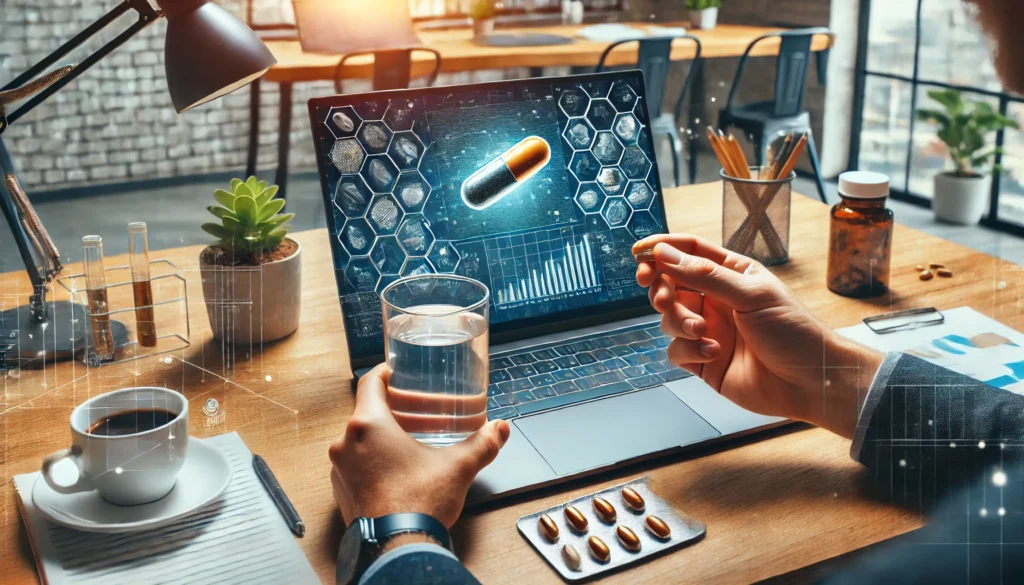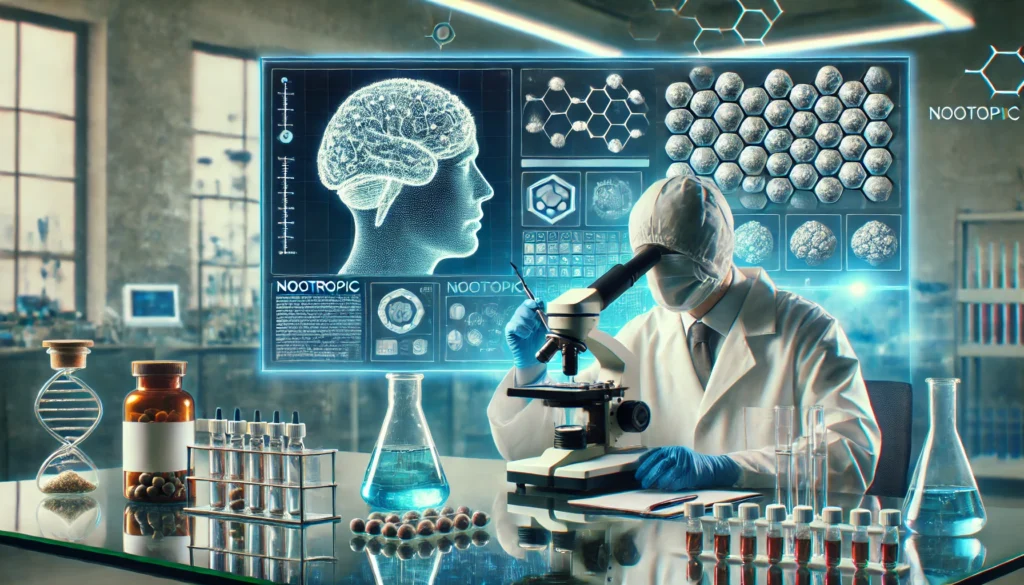The burgeoning field of nootropics offers an array of cognitive enhancers that promise to boost brain function. From students looking to improve focus during exams to professionals seeking to enhance cognitive performance, nootropics are gaining popularity across various demographics. But with so many options available, identifying the most effective nootropic sources can be daunting. This article aims to demystify the world of nootropics by exploring their origins, efficacy, and the science behind their claims.
You may also like: Top Nootropic Brands for Enhanced Focus

Understanding Nootropics
Nootropics, often referred to as “smart drugs” or “brain boosters,” are compounds that improve cognitive function, particularly executive functions, memory, creativity, or motivation, in healthy individuals. The term “nootropic” was coined in the 1970s by Romanian psychologist and chemist Dr. Corneliu E. Giurgea. He defined nootropics as substances that enhance learning and memory, protect the brain from physical or chemical injuries, and increase the efficacy of neuronal firing control mechanisms.
Origins of Nootropics
The concept of cognitive enhancement is not new. Ancient civilizations used various herbs and plants, believing they could enhance mental clarity and focus. Eastern medicine, particularly in China and India, has long included herbs like Ginkgo biloba and Bacopa monnieri for their cognitive benefits. These natural nootropics are deeply embedded in traditional practices, often used in rituals and as daily supplements.
Modern Developments
The modern understanding and development of nootropics began in the 20th century. The discovery of synthetic nootropics revolutionized the field, offering more potent alternatives to natural compounds. Researchers began synthesizing compounds like Piracetam, which showed promise in improving cognitive function in clinical trials. The growing interest in brain health and performance has since fueled a surge in nootropic research and product development.
Defining Characteristics
For a substance to be considered a nootropic, it must meet several criteria set forth by Dr. Giurgea. These include enhancing learning acquisition, supporting brain function under disruptive conditions, and possessing neuroprotective properties. Additionally, nootropics should be non-toxic to humans, making them safe for long-term use. These defining characteristics help differentiate nootropics from other cognitive enhancers that may not have the same safety profile.
Categories of Nootropics
Nootropics can be broadly categorized into natural and synthetic. Natural nootropics, such as Ginkgo biloba and Bacopa monnieri, have been used for centuries in traditional medicine systems. Synthetic nootropics, like Piracetam, were developed in laboratories and are often more potent.
Natural Nootropics
Natural nootropics are derived from plants, herbs, and other naturally occurring sources. They are often used in holistic medicine and are believed to offer a more balanced approach to cognitive enhancement. Examples include adaptogens like Ashwagandha, which may help manage stress and improve focus, and Omega-3 fatty acids, essential for brain health and cognitive function.
Synthetic Nootropics
Synthetic nootropics are man-made compounds designed to target specific neurotransmitter systems or brain functions. They are often more potent and have a more pronounced effect on cognition. Examples include Racetams, which are widely studied for their memory-enhancing properties, and Modafinil, a popular choice among individuals looking to boost alertness and executive function.
Functional Foods and Nutraceuticals
Beyond traditional nootropics, certain foods and dietary supplements are believed to offer cognitive benefits. Functional foods like blueberries and dark chocolate contain antioxidants that may support brain health. Nutraceuticals, which are fortified foods or supplements, include options like phosphatidylserine and acetyl-L-carnitine, both linked to improved memory and mental clarity.
The Science Behind Nootropics
The efficacy of nootropic supplements is a topic of considerable scientific debate. While some studies show promising results, others highlight the placebo effect or lack of significant cognitive enhancement. It’s crucial to understand that nootropics work by modulating neurotransmitter levels, improving blood flow to the brain, or providing neuroprotection.
Neurotransmitter Modulation
Many nootropics act by influencing neurotransmitter systems. For example, Racetams, a popular class of nootropics, are believed to enhance acetylcholine uptake in the brain, improving memory and learning. This modulation can lead to increased synaptic plasticity, making it easier for neurons to communicate and form new connections, essential for learning and memory retention.
Enhanced Cerebral Blood Flow
Some nootropics improve cognitive function by enhancing blood flow to the brain. Compounds like Ginkgo biloba work by dilating blood vessels, thus increasing the supply of oxygen and nutrients essential for optimal brain performance. This improved circulation can support better concentration and mental clarity, particularly in individuals with age-related cognitive decline.
Neuroprotection
Some nootropics offer neuroprotective benefits, shielding the brain from oxidative stress and damage. Antioxidants like Resveratrol and Curcumin fall into this category, potentially offering long-term cognitive benefits. These compounds help neutralize free radicals, reducing inflammation and protecting neural tissues from degeneration, which is crucial for maintaining cognitive health as we age.

Popular Nootropic Sources
The market is flooded with numerous nootropic sources, each claiming superior cognitive enhancement. Here, we review some of the most popular and well-researched options.
Natural Nootropics
Natural nootropics have been used for centuries and are generally considered safe. They often come with fewer side effects compared to their synthetic counterparts, making them a popular choice for those seeking a gentler approach to cognitive enhancement.
Ginkgo Biloba
Ginkgo biloba, derived from the leaves of the Ginkgo tree, is one of the oldest living tree species. It is believed to improve cognitive function by enhancing blood flow to the brain and has been shown to have potential benefits for memory and attention. Studies suggest that Ginkgo may be particularly beneficial for older adults experiencing cognitive decline, as it can improve symptoms of dementia and enhance overall mental function.
Bacopa Monnieri
Bacopa monnieri, a staple in Ayurvedic medicine, is renowned for its potential memory-enhancing effects. Several studies suggest it may improve memory retention and cognitive performance, particularly in older adults. Bacopa is thought to work by reducing anxiety and stress, two factors that can impede cognitive function, and by promoting the growth of nerve endings, which enhances neural communication.
Rhodiola Rosea
Rhodiola Rosea is an adaptogen known for its ability to combat fatigue and enhance mental performance under stress. It is popular among students and professionals who face demanding workloads, as it can improve concentration and reduce mental fatigue. Rhodiola works by influencing serotonin and dopamine levels, neurotransmitters that play a crucial role in mood and cognitive function.
Synthetic Nootropics
Synthetic nootropics offer more targeted cognitive enhancement and are often used by individuals seeking significant improvements in specific areas such as memory, focus, or wakefulness.
Piracetam
Piracetam is one of the earliest synthetic nootropics and is often used to enhance memory and learning. While its mechanism of action is not fully understood, it is thought to increase cerebral blood flow and influence acetylcholine levels. Studies have shown mixed results, but Piracetam remains popular for its potential to boost cognitive function without significant side effects.
Modafinil
Modafinil is a wakefulness-promoting agent used to treat narcolepsy but is also popular as a cognitive enhancer. It is believed to improve executive function, particularly in sleep-deprived individuals. Unlike traditional stimulants, Modafinil does not cause jitteriness or a “crash,” making it a preferred choice for those needing sustained alertness and cognitive clarity.
Adderall
Adderall, a prescription medication for ADHD, is sometimes used off-label as a cognitive enhancer. It is composed of amphetamine salts and works by increasing dopamine and norepinephrine levels in the brain. While effective at improving focus and attention, it carries a risk of dependence and side effects, making it essential to use under medical supervision.
Evaluating Nootropic Sources
When considering nootropic sources, it’s essential to evaluate their legitimacy and efficacy. Here are some factors to consider:
Scientific Evidence
Before trying any nootropic, examine the scientific research supporting its use. Peer-reviewed studies and clinical trials offer the most reliable evidence. It’s crucial to look at the sample size and methodology of these studies, as well as the credibility of the researchers involved, to assess the validity of the findings.
Safety and Side Effects
Consider the safety profile of the nootropic. While most natural nootropics are well-tolerated, synthetic options may carry a risk of side effects or interactions with other medications. It’s important to consult with a healthcare professional before starting any new supplement, especially if you have pre-existing health conditions or are taking other medications.
Supplier Reputation
Ensure you source nootropics from reputable suppliers. Check for third-party testing and transparency in ingredient sourcing and manufacturing processes. Reputable companies will provide detailed information about their products, including ingredient lists and potential allergens, and will adhere to quality standards set by regulatory bodies.
Regulation and Legality
The regulatory landscape for nootropics varies by country. Some synthetic nootropics may be restricted or require a prescription, while natural nootropics are generally more accessible. Familiarize yourself with the legal status of nootropics in your region to ensure compliance with local laws and regulations.
Cost and Accessibility
Consider the cost and accessibility of the nootropic source. High-quality nootropics often come with a higher price tag, but it’s important to weigh the potential benefits against the cost. Subscription services or bulk purchases may offer cost savings for regular users, while trial sizes can provide an affordable way to test efficacy before committing to a larger purchase.
Future Implications of Nootropics
As the field of nootropics continues to evolve, researchers are exploring new compounds and their potential applications. Advances in neuroscience and technology may lead to the development of more targeted and effective cognitive enhancers.
Personalized Nootropics
The future may see the rise of personalized nootropics, tailored to an individual’s genetic makeup and cognitive needs. This approach could maximize efficacy while minimizing adverse effects. Advances in genomics and biomarker research may enable the customization of nootropic regimens, offering more precise and personalized solutions for cognitive enhancement.
Integration with Technology
The integration of nootropics with technology is a promising frontier. Wearable devices and brain-computer interfaces could monitor cognitive performance and adjust nootropic dosages in real-time. This synergy could lead to more effective and responsive cognitive enhancement strategies, optimizing mental performance in various settings, from education to professional environments.
Ethical Considerations
The increasing use of nootropics raises ethical questions about cognitive enhancement. Society must consider the implications of widespread nootropic use, particularly in competitive environments like academia and the workplace. Issues such as fairness, accessibility, and the potential for misuse or coercion must be addressed to ensure ethical guidelines are established and followed.
Impact on Healthcare
Nootropics have the potential to impact healthcare by offering new avenues for treating cognitive disorders and age-related decline. As research progresses, nootropics could become part of standard treatment protocols for conditions like Alzheimer’s and dementia, providing new hope for patients and caregivers. However, robust clinical trials and regulatory approval will be necessary to integrate nootropics into mainstream medicine.

Conclusion
Nootropic sources offer promising avenues for cognitive enhancement, but it’s crucial to approach them with a critical eye. While some nootropics have a strong scientific backing, others rely heavily on anecdotal evidence. By understanding the science, evaluating the evidence, and considering future implications, individuals can make informed decisions about incorporating nootropics into their cognitive enhancement strategies.
In conclusion, the world of nootropics is vast and varied, with potential benefits and risks. Whether you’re a health and wellness coach, a science journalist, or a biohacker, staying informed about the latest research and trends will equip you to navigate this dynamic field effectively. Embracing a balanced approach that considers personal goals, scientific evidence, and ethical considerations will be key to harnessing the full potential of nootropics for cognitive enhancement.
Further Reading:
Nootropics Claim to Boost Cognitive Function, But How Legit Are They?
Important Note: The information contained in this article is for general informational purposes only, and should not be construed as health or medical advice, nor is it intended to diagnose, prevent, treat, or cure any disease or health condition. Before embarking on any diet, fitness regimen, or program of nutritional supplementation, it is advisable to consult your healthcare professional in order to determine its safety and probable efficacy in terms of your individual state of health.
Regarding Nutritional Supplements Or Other Non-Prescription Health Products: If any nutritional supplements or other non-prescription health products are mentioned in the foregoing article, any claims or statements made about them have not been evaluated by the U.S. Food and Drug Administration, and such nutritional supplements or other health products are not intended to diagnose, treat, cure, or prevent any disease.


